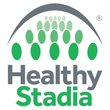Healthy Stadia Assessments carried out for UEFA competition venues
As part of its partnership with the World Heart Federation and UEFA’s Football and Social Responsibility unit, Healthy Stadia has undertaken health impact assessments for the host stadia of UEFA’s European club competition finals for 2017: Champions League – Principality Stadium, Cardiff; Europa League – Friends Arena, Stockholm; and, UEFA Super Cup – Philip II National Stadium, Skopje.
All host stadia have undertaken a three step process between November 2016 and March 2017 consisting of: a baseline survey providing an initial benchmark of any health promoting policies and practices in current operation; a site inspection and stakeholder meeting with Healthy Stadia; and, a final report and set of recommendations for stadia and tenant clubs. Specific recommendations are also developed for UEFA to help implement the No Tobacco policy that runs across all of UEFA’s club and international competition finals.

From left to right: UEFA Champions League, Cardiff – Principality Stadium; UEFA Europa League, Stockholm – Friends Arena; UEFA Women’s EURO 2017 Final Venue, Enschede – FC Twente Stadion.
The Principality Stadium scored particularly well in relation to tobacco control with all tobacco and e-cigarette products completely prohibited under stadium regulations, whilst the stadium also has a particularly strong set of environmental sustainability initiatives. Up at the Friends Arena in Sweden – home of AIK – there is a very strong emphasis on sensible levels of drinking with supply of low alcohol beers, sales restrictions, and a dedicated programme called ‘Fotboll utan fylla’ in conjunction with IQ, a Swedish based organisation working to encourage sensible drinking levels and reduce alcohol related morbidity. Similar assessments have also been carried out for venues hosting the semi-finals and final of Women’s EURO 2017 that will be hosted in the Netherlands between 16th July and 6th August.
Healthy Stadia’s work for club competition finals and Women’s EURO 2017, along with a wide selection of social responsibility partnerships and activities, was included in discussion at UEFA’s recent ‘Football and Social Responsibility Partners Workshop’ on 21 and 22nd June at UEFA headquarters in Nyon, Switzerland.
Attending for Healthy Stadia this year was Development Officer Michael Viggars who commented:
“It was interesting to see how UEFA’s commitment to social responsibility and sustainability has evolved over the past few years and how it is adapting its approach to tackle contemporary issues whilst staying true to its core values.
“The workshop was a great opportunity to learn about some of the excellent work other partners are undertaking to address issues around diversity, inclusion and fan engagement and also to discuss potential opportunities for collaboration moving forward.”
Click the following link to find out more about UEFA’s social responsibility partnerships and FSR Report for 2015/16.

Tobacco-Free Stadia Guidance






